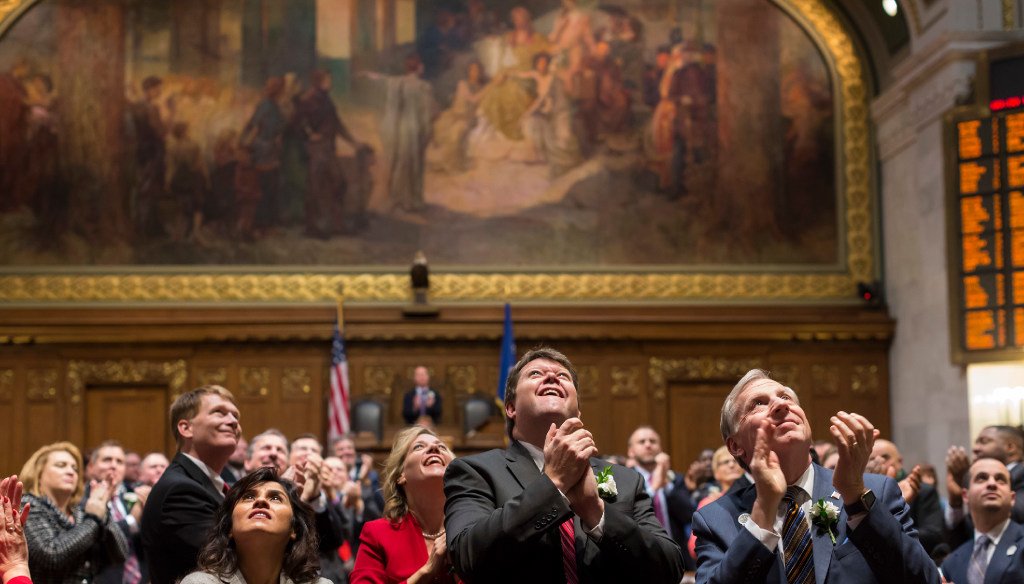



State representatives applaud former Assembly Leaders seated in the gallery during the 100th opening ceremony of Wisconsin State Legislature Jan. 3, 2017, in Madison, Wis. (Photo © Andy Manis)
Since becoming the minority party in the Assembly in 2011, the percentage of Democratic-authored bills that received a public hearing declined from 15.6% to 1.9% in the 2021-22 legislative session.
Republicans, when in the minority, saw 39% of their bills receive public hearings in the 2009-10 legislative session.
More than 70% of their bills have received hearings since taking over in the 2011-12 session.
As Wisconsin barrels toward the August primaries and the fall election, state Democrats are pointing out an imbalance in Madison.
In the Legislature, Republicans have had control of both chambers since the 2010 election — and could expand their advantage this fall due to even more favorable maps.
But that’s not the imbalance state Rep. Francesca Hong, D-Madison, had in mind when she tweeted this on May 18, 2022:
"In the Wisconsin State Assembly this session, more than 75% of GOP bills received a public hearing. Meanwhile, the GOP allowed less than 2% of Democratic bills to have a hearing."
Is she right?
Hong’s staff said the claim, and others she made in the series of tweets, came from two memos issued by the Wisconsin Legislative Reference Bureau that looked at statistics on bills given hearings in the state Assembly.
Jillian Slaight, managing legislative analyst for the Legislative Reference Bureau, told us similar memos have not been compiled for the state Senate.
The memos, issued May 9, 2022, track data from 2009 to 2022. In the 2021-22 legislative session, Republicans gave 76.5% of their party’s bills public hearings. Meanwhile, just 1.9% of bills authored by Democrats received public hearings.
So, Hong cited the numbers correctly in her tweet.
If the gap seems especially imbalanced, that’s because it’s a far cry from just over a decade ago.
Democrats last controlled the Assembly in the 2009-10 session. In that session, 80.1% of Democratic-sponsored bills received public hearings, but 39% percent of Republican bills also had hearings.
Control of the Assembly flipped in 2010, and with the election of Gov. Scott Walker, the GOP had full control of state government — so there was little functional need for bipartisanship to move matters forward. In the years that followed, the percentage of bills authored by Democrats that received public hearings cratered.
In the 2011-12 and 2013-14 sessions, for instance, about 15% of Democratic-authored bills received a hearing. As noted, it was less than 2% in the current session.
To give a sense of scale on the number of bills handled by the Legislature, the volume of bills introduced in a given session, by both chambers, from 2009 to 2020 ranged from 1,325 to 1,970, according to the most recent Wisconsin Blue Book,
Hong claimed that in the current legislative session "more than 75% of GOP bills received a public hearing. Meanwhile, the GOP allowed less than 2% of Democratic bills to have a hearing."
Statistics compiled by the nonpartisan Legislative Reference Bureau show she is correct, with a steep decline occurring since Republicans took over after the 2010 election. In the previous session, when Democrats had control, some 39% of Republican-sponsored bills got a hearing.
We rate this claim True.
Email with Jillian Slaight, Legislative Reference Bureau managing legislative analyst, June 29, 2022
Legislative Reference Bureau, 2021-22 Wisconsin Blue Book, accessed July 1, 2022
Legislative Reference Bureau, memorandum on assembly legislative session statistics, 2009-22 for minority party, accessed June 29, 2022
Legislative Reference Bureau, memorandum on assembly legislative session statistics, 2009-22 for majority party, accessed June 29, 2022
In a world of wild talk and fake news, help us stand up for the facts.
